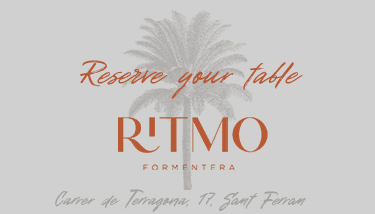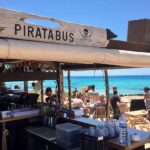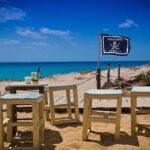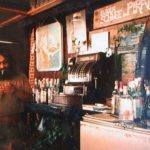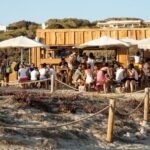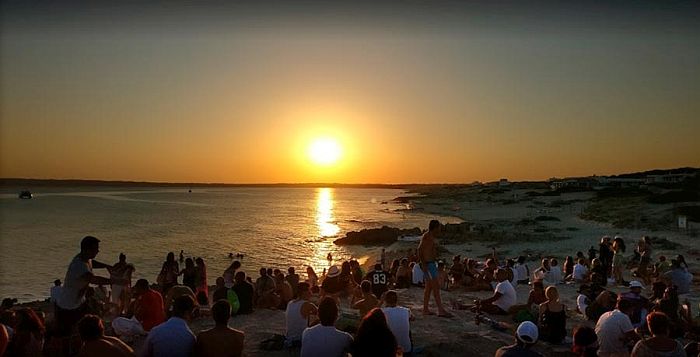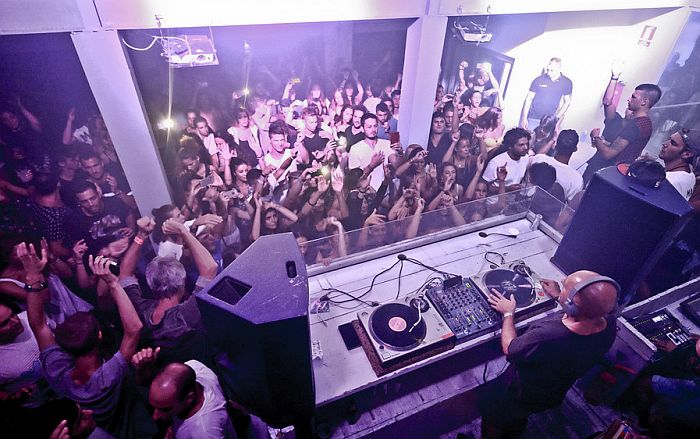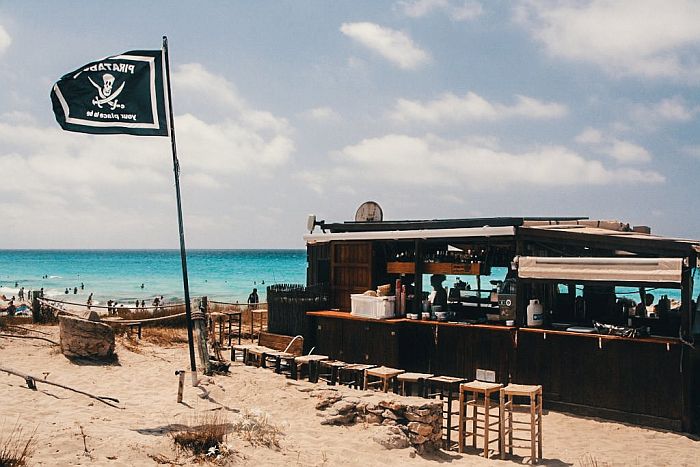
Piratabus: the history of the iconic beach bar
The Piratabus was much more than just a beach bar: it was an unforgettable icon, a symbol of the soul of Formentera. Born on the wild beach of Migjorn, at kilometer 11, it enchanted generations of visitors with its unmistakable hippy atmosphere and its legendary mojito.
Its story, shrouded in a legendary aura, began in a small Spanish town, where a chance encounter between local youth and German hippies gave birth to a bold dream: to create a magical refuge on the beach. And so, an old bus was transformed into a one-of-a-kind venue, quickly becoming the beating heart of Migjorn.
For decades, the Piratabus has been a landmark for those seeking an oasis of peace and authenticity. A place where time seems to slow down, as the waves of the sea accompany sips of a carefully crafted cocktail, in a relaxed and welcoming atmosphere.
Unfortunately, in 2024, due to new regulations on beach concessions, Piratabus had to close its doors. In its place, the KM11 beach bar has emerged, trying to keep the magic of this iconic place alive. However, for many, Piratabus will always remain an unforgettable memory, a symbol of an era and a lifestyle that is now gone.
The history of the Piratabus
In Calatayud, a small Spanish town in the province of Zaragoza, in the 1970s, two young friends, Pascual, nicknamed “The Pirate”, and Pablo, ran a disco. One day, a chance encounter brought them into contact with a group of German hippies who were traveling in a colorful van, exploring the islands of southern Spain: Ibiza and the smaller Formentera.
The stories of those young dreamers, belonging to the “peace and love” movement, painted an idyllic picture of Formentera: a paradisiacal island almost devoid of electricity, with enchanting beaches and a slow, relaxed pace of life. In contrast to the austere and conservative reality of Franco’s Spain, Formentera seemed like an oasis of freedom.
Curious and fascinated, Pascual and Pablo decided to visit the island: so close geographically, but so far from the typical lifestyle of their town. And it was love at first sight. The mystical and powerful energy of Formentera enchanted them. A virgin piece of land, where the days were marked by the rhythm of the sun. An unconventional place, synonymous with peace and tranquility.
Back in Calatayud, they didn’t think twice: they sold the nightclub and returned to Formentera, ready to live a new life.
For nearly a year, the two friends immersed themselves in the captivating hippie world that pulsated in Formentera. Around the picturesque village of El Pilar de La Mola, a vibrant community had formed, attracting young people from all over Europe, seduced by the unspoiled island and the promise of a return to their roots.
Their meeting place was the Fonda Pepe, an old inn in the heart of Sant Ferran, where they discussed literature, art, politics, and held long jam sessions. But time passed relentlessly, and the need to earn a living pushed them towards a brilliant idea: to create a bar of their own.
Unaware of the success that awaited them, they bought an old, decommissioned bus and placed it on the beautiful beach of Migjorn. Thus, the legendary Piratabus was born.
The history of its beginnings sees this unusual place as a meeting point for the hippy community and beyond. Even the island’s inhabitants and tourists who were gradually beginning to visit Formentera were inevitably drawn to that bizarre van that dispensed drinks.
The bus’s unusual appearance, with its black flag adorned with a skull and two crossed swords, made it unmistakable. An explicit homage to its founder, the legendary “Pirate”. The slogan “your place to be” was emblazoned on the flag, like a warm welcome to all those seeking refuge from the routine.
Whether at the eastern or western end of Migjorn beach, the eye was inevitably drawn to the famous pirate flag. The Piratabus was a place to feel at home and share unforgettable moments.
At the Piratabus, days passed happily, a constant coming and going of music and laughter. It wasn’t at all uncommon to see someone pick up a guitar to liven up the days. Although there are few photos from that time, the carefree atmosphere that hovered in that place was palpable.
After three years of this idyllic life, made up of sun, sea, and music, Pablo decided to say goodbye to the island and the beach bar. Pascual, however, did not intend to abandon his creation and continued the activity, surrounded by friends and occasional collaborators. The Piratabus had become an indispensable point of reference for Formentera.
The 1960s and 1970s were a golden age for the Piratabus. The island became a sought-after destination for world-famous artists such as Bob Dylan, Chris Rea, and Pink Floyd, who held an intimate concert in Formentera in 1971, inaugurating the Tipic nightclub in Es Pujols.
In 1983, the entry into force of new regulations required Pascual to adapt the beach bar. To comply with hygiene and environmental standards, the old bus was dismantled and replaced with a wooden structure. Despite the change, the charm of the Piratabus remained unaltered.
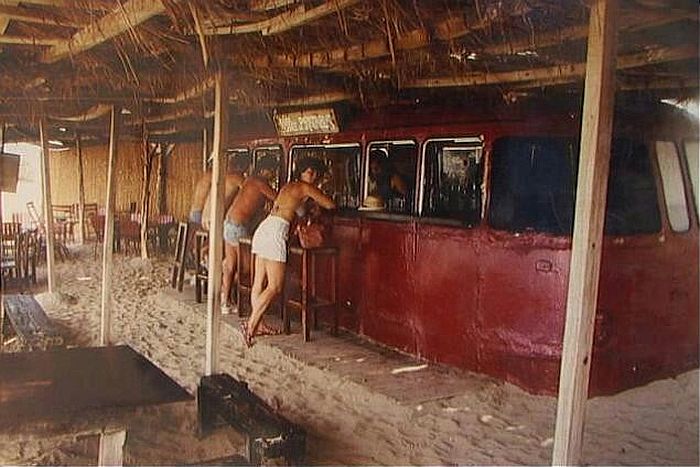
Shortly after, Edith, a German girl who won his heart, arrived in Pascual’s life. Together, they successfully managed the beach bar, making it even more welcoming.
However, new regulations imposed further modifications, reducing the size of the establishment. But the customers didn’t complain: the proximity and authenticity of the Piratabus were what made it unique. Edith and Pascual, respecting the island, willingly accepted the new measures, keeping the soul of their beach bar intact.
The secrets of the Piratabus’ popularity
On Migjorn beach, with the arrival of summer, tourists multiplied like grains of sand. Pascual, with his innate entrepreneurial spirit, didn’t sit idly by. He organized a real brigade of young, agile, and passionate people, ready to quench customers’ thirst with the freshest cocktails, first and foremost the legendary mojito.
The preparation of the drinks was a perfect machine: three bartenders, like a well-coordinated team, divided the tasks, creating a production line that allowed them to serve cocktails in record time, without sacrificing quality.
Another element that made the Piratabus an icon was its ability to communicate through images. An official photographer immortalized every moment, capturing the unique atmosphere of the venue and the passion of its staff. The Piratabus Instagram page is a true open-air art gallery, with photos and videos that tell the story of a place that has become a meeting point for thousands of people.
But it was at sunset that the Piratabus offered the most intense emotions. As the sun gently slipped below the horizon, the notes of Andrea Bocelli’s “Con te partirò” enveloped the atmosphere, creating a magical and romantic ambiance. The tenor’s voice blended with the sound of the waves, creating a unique symphony.
The Piratabus was much more than just a beach bar: it was a place for the soul, a meeting point for generations of travelers. Anyone who has spent a summer in Formentera carries in their heart the memory of unforgettable pre-dinner drinks, with music, cocktails, and breathtaking sunsets.
The beach bar today
In 2022, a public tender for the concession of beach bars on the beaches of Formentera marked a radical turning point, ending an era. Historic family-run businesses, linked for decades to these iconic locations, saw a seemingly certain opportunity slip away, sparking widespread discontent.
However, in 2024, a new story began right where another had ended. In place of the Piratabus, the KM11 beach bar was born, a venue that, while renovated, retains the intact hippy spirit of its predecessor. Opened in August, the KM11 quickly became a reference point for those wishing to escape the scorching sun or admire magnificent sunsets just a few steps from the sea.
The name derives from its location (specifically, the kilometer that separates it from the town of La Savina) but also from the initials of the new ownership, namely the Kiosko Manolito company, a beach bar that has been present on Llevant beach for years.
A touch of continuity is given by the presence of the historic Piratabus staff, who have welcomed back loyal customers with joy, giving a sense of familiarity. And, of course, the legendary mojito continues to be one of the most beloved cocktails.
The KM11 is ready to write new pages of history, to create new legends that will be handed down through the ages. By renting an apartment in Formentera, you can be the protagonist of these new adventures, just a few steps from the sea.
The Piratabus will forever remain in the hearts of those who have had the fortune to experience its magic, but the KM11 is ready to collect its legacy and become a new symbol of Formentera.
Piratabus picture gallery
- The view of the Piratabus
- The mojitos of Piratabus
- The Piratabus flag
- Pascual in the 1970s
- KM11 beach bar







